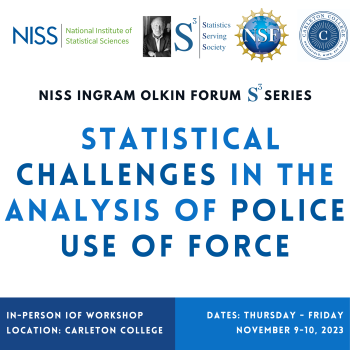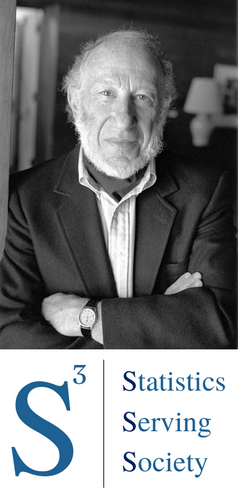
In November 2023, NISS and Carleton College hosted the Ingram Olkin Forum "Statistical Challenges in the Analysis of Police Use of Force." This in-person Ingram Olkin Forum (IOF) is an extension to our earlier online IOF webinar hosted in June 2021 featuring speakers Dean Knox (University of Pennsylvania), Travis Riddle (National Police Foundation), and Robin Engel (University of Cincinnati); the webinar was moderated by Claire Kelling (Carleton College). During the in-person forum, statisticians, sociologists, policymakers, and others discussed unique approaches and perspectives and began to develop steps that statisticians and researchers could consider that might aid in a deeper understanding of these issues and provide better evidence to inform reform efforts. There were five plenary sessions that discussed (1) Quality Issues with Aggregate Crime Data, (2) Statistical Issues in Analyzing Fairness and Bias, (3) Unstructured Data: Prospects and Challenges, (4) Data Access and Privacy Considerations, and (5) Community Collection and Use of Policing Data. There was also a sixth session that discussed funding opportunities, including sources such as government and foundations.
See Photos: 2023 IOF Workshop: Statistical Challenges in the Analysis of Police Use of Force
Roundtables were held throughout the workshop to promote conversation and future collaborative opportunities. On Day 1, individuals were randomly assigned to brief Introductory Roundtables to encourage participants to network and meet others outside of their normal research circles. In the morning of Day 2, we held working roundtables to encourage conversation around many themes, including fairness and bias, integrating research and practice, standardization, causal inference, and others. Participants had the opportunity to change roundtables for the afternoon session and all groups shared brief slides to summarize their discussion at the synthesis session at the conclusion of the forum.
This forum was motivated by the urgent issue of excessive use of force by police which has been a major concern to sociologists, statisticians, policymakers, and the general public. The data available to inform research into this issue comes with unique challenges that must be appropriately addressed. Issues with data quality, processing of unstructured data, tradeoffs between data access and privacy concerns, statistical challenges in analyzing fairness, and other topics have been highlighted as specific areas of concern.
In addition, the methodologies used to analyze police use of force are varied and results are often incompatible or rely on implausible unstated assumptions. As a result of this data environment, researchers working in this area who don't carefully consider the challenges run the risk of presenting inaccurate conclusions, diluting the general public's ability to understand the issues, reinforcing false narratives about police violence, and alienating affected communities. In the worst case, such analyses bolster impunity and hinder reform efforts. For these reasons, it's essential to prepare researchers working in this area to do rigorous and defensible work on this urgent issue. During this forum researchers and practitioners who have been working on questions of police force and who have developed methodologies helped outline the unique challenges this research presents can share their experiences and lessons learned.
We had around 100 total participants at the forum, including a mix of faculty (junior and senior), students (undergraduate and graduate), and practitioners (such as community activists and people from community/governmental organizations). This forum helped foster dialogue between three primary audiences: attendees who can begin impactful research immediately (junior and senior faculty), attendees who will constitute the future of the profession (students), and attendees who will be able to provide guidance on the need for and potential impact of this work (community and government organizations). At the forum, there was a mix of both technical and broad talks to engage all of these audiences in order to inform participants about the state of research in this area, and working roundtables to discuss and begin work on future approaches to advance statistical research on police use of force. As an outcome of the forum, we hope to initiate new statistical research to better understand systemic factors that contribute to police violence, so that this forum can help facilitate the implementation of equitable practices.
Participants had the opportunity to have a long discussion session after the presentations from our speakers at the forum. From this session and the post-forum evaluation survey, there is a desire for more/improved data on policing and identifying ways to work with practitioners on improved analytical methods. There is hope for more workshops on different methodologies that cover useful methods in working with complex data and designing rigorous studies with practitioners to test the effectiveness of various interventions.
Upcoming Working Groups: There are many exciting opportunities to be involved in this research moving forward. Beginning in January 2024, working groups will be established to conduct research on many of the topics discussed at the forum. There is also a forthcoming white paper being developed to discuss the output of the forum. Please contact Claire Kelling (ckelling@carleton.edu) if you would like to be involved in these efforts.
A Session at JSM 2024 in Portland will be organized on the IOF workshop Police use of force - more details to come!
About the Ingram Olkin Forum Series
 Ingram Olkin (S3) Forums are a series of forums to honor the memory of Professor Ingram Olkin presented by the NISS Statistics Serving Society (S3).
Ingram Olkin (S3) Forums are a series of forums to honor the memory of Professor Ingram Olkin presented by the NISS Statistics Serving Society (S3).
Each forum focuses on a current societal issue that might benefit from new or renewed attention from the statistical community. The S3 Forums aim to bring the latest innovations in statistical methodology and data science into new research and public policy collaborations, working to accelerate the development of innovative approaches that impact societal problems. As the Forum will be the first time a particular group of experts will be gathered together to consider an issue, new energy and synergy is expected to produce a flurry of new ideas and approaches.
Visit the IOF page for more information: https://www.niss.org/ingram-olkin-forums
